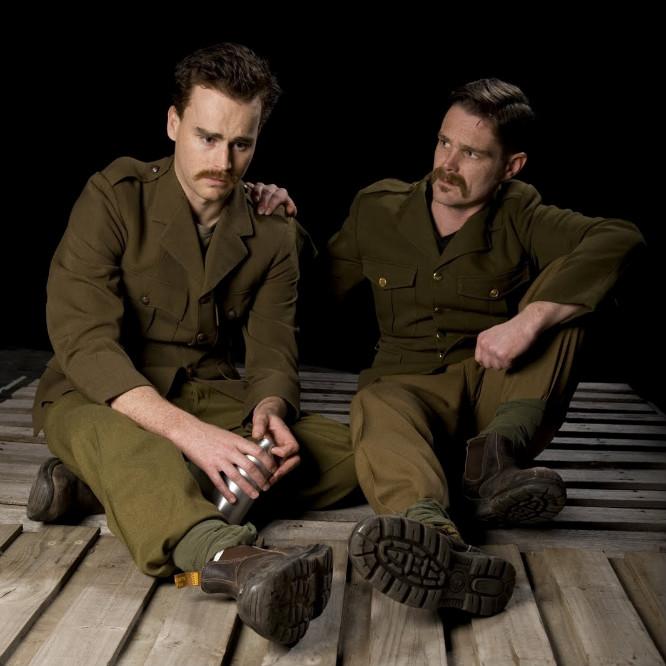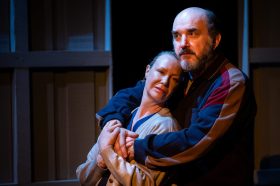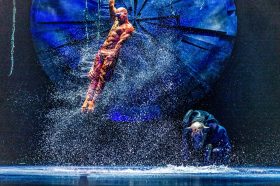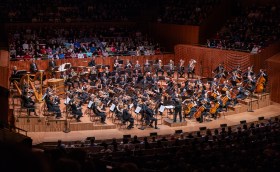Originally written in 1985, Frank McGuinness’ play about war, religion and the Irish hasn’t aged much, although the fierce, bitter opening monologue by the elder Pyper (Ian Rooney) gains extra poignancy with the death, in May this year, of the last WWI combat veteran.
First, some background. The Irish independence movement was on the brink of a resolution when WWI broke out, delaying the bill that would have given Southern Ireland independence, and delaying the fight over prosperous, Protestant Ulster in the North. The war became a kind of macrocosmic representation of the conflict between the two Irelands. Ulster sent its anti-unionist boys off to fight for the United Kingdom, while the Fenian Irish Republican Brotherhood, back in Dublin, staged the 1916 Easter Uprising with German guns, and even offered the Germans a plan to gain a military foothold in the country.
On the first day of the Battle of the Somme – widely regarded as the most useless loss of life in the war – the 36th (Ulster) Division were the only group to capture their intended position, at the cost of over 5000 lives – more than half of those attacking – only to be forced to abandon it again that night.
Of course, I’m telling you this after an extensive journey around Wikipedia – the play itself swoops swiftly over and through the fierce political tensions that underlie its characters’ every move and thought, and draws a curtain over the slaughter. As a viewer, one gets confusing glimpses of strong tides underlying the action, but the play feels written for people more familiar with Irish history than the average Brunswick theatregoer. McGuinness, as a Catholic writer, raised some eyebrows on the play’s premiere for writing over the fence (so to speak) about a conflict which divided neatly along religious lines, and one that was very much alive in 1985.
Luckily, the occasional confusion about what a Fenian is or why a tricolour is important is secondary to the emotions that God, country and impending doom generate in McGuinness’ eight soldiers of the 36th. The play is sharp, reflective, intense and often funny; it explores the relationships between men who face their own death in the service of something they can’t see or even really understand – God, Ireland, or possibly just Top Brass.
While the first half of the play has a distinctly awkward, forced feel, the cast really got going with the emotional material of the second half, staged as tiny interlacing duets between denial and despair in the face of the horrors of war. Dan Wallis, as the fatalistic survivor Pyper, is particularly good.
The stage – described as ‘theatre in the round’ but really more ‘theatre in the rectangle’, and if you’re in the front row, ‘theatre in your lap’ – takes up at least three quarters of the venue, making this a very intimate performance, occasionally with the head-turning of a tennis match. The piece suffers somewhat from the dilemma of accents – while the boys are Irish and must sound Irish, there are frequent moments where they’re making it up as they go along, and others where the brogue is so thick as to be nearly incomprehensible. However, the costumes – if they could even be called that, being a mixture of original and impeccable replicas – lent the play a definite authenticity.
This play is a bit of a departure from the usual work for director Steven Dawson, whose back catalogue is chockers with scantily-clad mano-a-mano action. That said, Sons of Ulster does focus entirely on intimate, vulnerable male relationships, and while nobody got naked, there may have been a bit of smooching. (Unfortunately, due to the drawbacks inherent in theatre in the round, I can neither confirm nor deny, but probably don’t bring your homophobic war-buff cousin along to this one.)
Rating: Three and a half stars
Hoy Polloy present
Observe the Sons of Ulster Marching Towards the Somme
By Frank McGuinness
Director and Design: Steven Dawson
Stage Manager: Ness Harwood
Featuring: Nicholas Brien, Angus Brown, Karl Cottee, Kevin Dee, Mathew Gelsumini, Tosh Greenslade, David Passmore, Ian Rooney and Dan Walls
Mechanics Institute Performing Arts Centre, Brunswick
July 28 – August 13
hoypolloytheatre.blogspot.com





